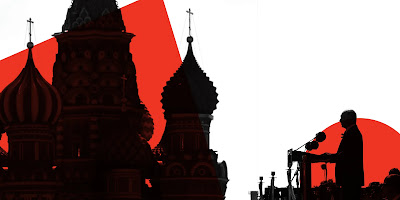
Dear Readers, Today we will Talk about the 4th Point about Soviet Style : “Adversary concessions viewed as weakness“.
The Russians, going back to the czars, have always respected Power while exhibiting distrust for foreigners that occasionally bordered on paranoia. They still believe that the best way of gaining the cooperation of others is to exhibit a willingness to employ overwhelming force.
In this, their philosophy of détente resembles that of the Roman Empire, which maintained peace ( Pax Romana ) based on a frequently demonstrated readiness to use force.
Whereas western diplomats generally regard negotiations as compromise between conflicting positions, the Kremlin sees them as a struggle to be won. To them it is a figurative street fight, and if an opponent adheres to the Marquis of Queensbury Rules they begin to question the opposition’s Real Strength.
Obviously the same attitude of victory at all costs does not pervade our thinking. Sure, there are some parts of our society where strong competitive attitudes prevail: presidential elections, competitive sports, litigation in our adversary legal system, and business, where we sometimes speak of “Winning a Promotion” and “Beating the Competition“
Conceivably, our own home-grown Soviets, who believe that ruthless competition is part of the divine plan, have generalized from limited observations of these areas. In spite of the Win-Lose minority, most of us tend to accept a solution that is best for all rather than trying to get our own way.
Moreover, we may mistakenly ascribe the same motives and philosophy to all others with whom we deal.
This Means that the typical American or Western Negotiator, when confronted with a stalemate, is often willing to make the first concession to get things moving. We assume that the other party will respect the candor and collaborative spirit and reciprocate. Actually, if you are dealing with a Soviet-Style operator, the opposite is true.
During the armistice negotiation ending the Korean War, both sides stated their initial demands regarding the location of the final Truce Line.
Obviously, they were far apart. Suddenly the United Nations negotiators, departing from appropriate adversary bargaining practices, made a quick major concession. In trying to be conciliatory with the “Soviets” from being perceived as reasonableness, it gave the impression of weakness to our opponents and hardened their negotiating posture.
The American admiral, C. Turner Joy, who headed the U.N negotiating team at Panmunjom, later admitted that this quick concession ( which was never returned in kind ) gave the Communists a big advantage in the negotiations.
Writing of this experience he said, “ Because of our American Tendency to feel that a deadlocked issue should be solved by mutual concessions, the Communists are on favorable ground in applying their Delaying Tactics.”
In Essence, when dealing with Soviets, whatever their pedigree, should you generously concede something to them, it is unlikely that a reciprocal concession will be forthcoming.
Remember the example of the Soviets’ trying to Purchase Property on the North Shore of Long Island?
We saw how they offered $125,000 against an asking price of $420,000.
When after 3 months the sellers reduced their demand to $360,000, how did they respond? Before answering that question, I ask you, “ What would most of us do if we were in their position as buyers?”
If our attitude is embodied in the sayings, “Give a little, get a little,” or “One hand washes the other, ” we would make a counter-offer increasing the initial lowball offer.
The Soviet Union’s Negotiators, like the North Koreans, did no such thing. On the contrary, they remained firm at $125,000. They viewed the $50,000 concession by the sellers not as a gracious gesture, but as vindication and a sign of weakness.
As a consequence, they held firm at their initial offer for 8 months; then they penny-pinched their way to $133,000.
It should not have been unexpected, as the next step in their Tactical Pattern Indicates.
Well, Readers we have discussed today about ” Soviet Style | Adversary concessions viewed as weakness “Do not Forget to Follow my website for Future Updates. The Next Point we will be discussing is:
“Winning at all Costs: Soviet Style | Stingy in Concessions“
One thought on “Winning at all Costs: Soviet Style | Adversary concessions viewed as weakness”